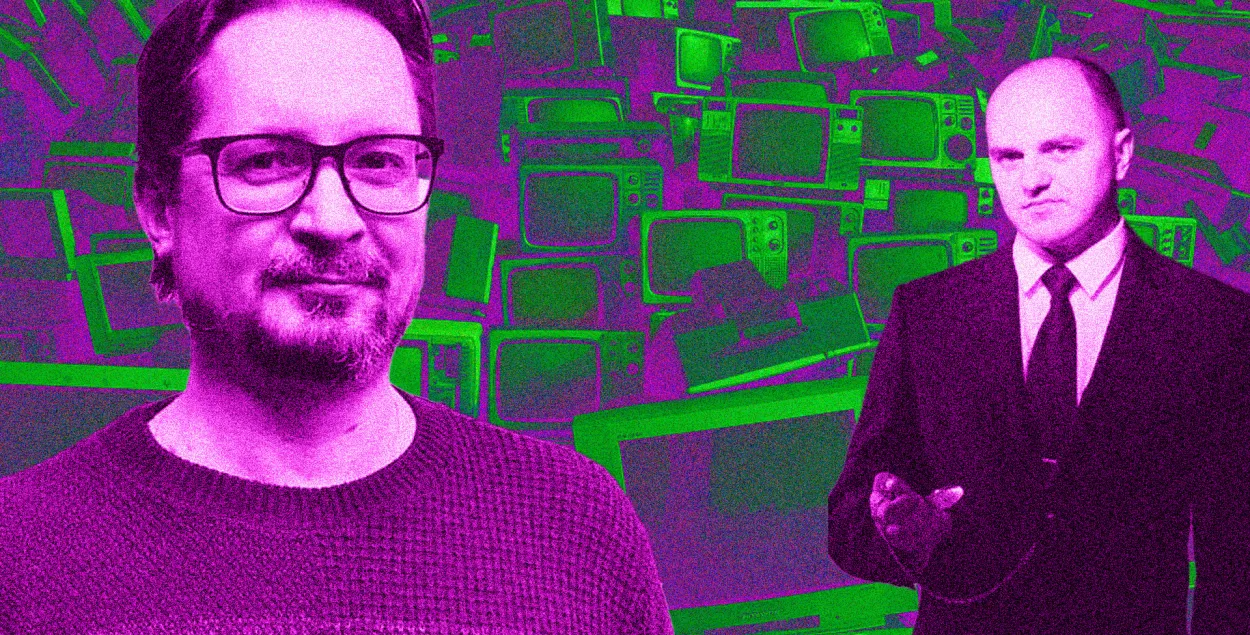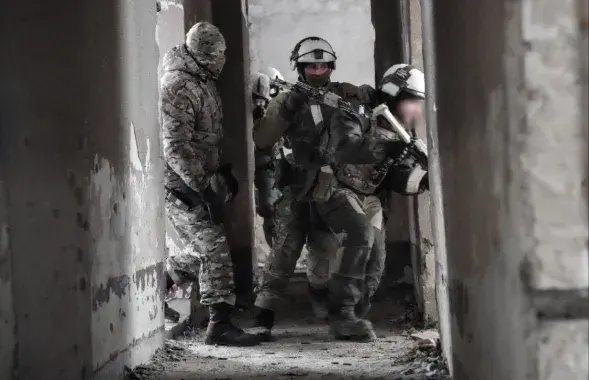Experts explain the dangers of propaganda in Belarus

Syarhei Chaly and Yahor Lebyadok / Euroradio
"Politics must be everywhere," independent analyst Syarhei Chaly succinctly describes the purpose of Alyaksandr Lukashenka's speech at the All-Belarusian Pedagogical Council.
"It is a very wrong attitude to not listen to this propaganda. Unfortunately, at least everyone hears it," says military expert Yahor Lebyadok.
Euroradio has interviewed experts who argue about the spread of propaganda in Belarus from the cradle to the grave and the counteraction to it.
People "don't listen to propaganda" but they hear it
"Whether it's nonsense from Azaronak or when the military instructor reads a tutorial, everyone hears it," says Yahor Lebyadok. "And when they've been hearing it for a few years, it becomes a natural background for us. That's another thing propaganda is aimed at the formation of a natural feeling. For example, when they talk about corruption, it levels the perception of the corruption level. For example, a Belgian, seeing a message about corruption, will react more harshly to it than a Russian, for whom corruption is natural background."
Never fall for the notion that propaganda isn't listened to, that it's silly and uninteresting. That's right, but when it's put on a long-term stream, it always works, unfortunately.
You cannot educate either a child or an adult with just one conversation, saying, "Don't listen, it's nonsense. Such education will never have any effect. Both education and opposition to propaganda is a systemic job, and it cannot be done any other way."
Threat for dictatorial system
"In essence, there is only one task. It is to turn the Belarusians into what they have in Russia: Stalinists, monarchists and the Orthodox. The Orthodox - because all the other confessions are "alien and hostile," and we need our own controlled church. It is clear that Orthodoxy will be rigidly introduced. The Soviet Union, Stalin, all is well -- it is dogma.
If you listen to Lukashenka and try to understand who he is guided by, it's just Russian propaganda. It's just that now it will be extrapolated on the Belarusians and make Belarusians into Russians. As he said, the Belarusians are no different from them. That's why everything is clear in terms of religion.
Speaking at the pedagogical council, Education Minister Ihar Karpenka tried to say that a person and his thinking begins to shape in kindergarten. "Be free, but be responsible for yourself," or "obey and wait for someone to praise you," or "watch how you are evaluated by the authorities" - all these things start in the family first of all, and then in kindergartens. And of course when, as it happens with us, it is a common practice to kick a child meaning to say "don't go there", "sit like that", "use your right hand to draw", and so on, this clearly forms a person with a rigid system of obedience."
When kindergartens operate according to the principles of freedom like "make your own choice" and "move but accept responsibility," a different person is brought up. Naturally, such people are a threat to the dictatorial system. In fact, this is what Karpenka wanted to say [the official called private kindergartens and schools "starting points for the color revolution Euroradio].
He says that the entire system of education and everything that concerns people in general should be totally subordinated to the state. In Lukashenka's words, it means "make the order." That is, there must be a society of total subordination, and, accordingly, the entire system, which involves people from birth to death. Everything must be tied to the state, that is, to the subordination of Lukashenka's power.
Patriotism does not mean love for the current government at all
"Sports, education, and everything that can be outside politics mean that there should be no politics there, except for the state one," reminds Syarhei Chaly of what Lukashenka said. "In fact, this was his very thesis. Education is not a service or business, but a product of our statehood. Educators and teachers form the national identity."
What followed was some very strange shift towards patriotism, which is understood precisely as love for the state, or rather, for the leadership of this state. Not to the motherland.
Saying that no school remains outside politics and that politics can only be state politics, he cites a number of countries. In fact, in all normal countries, with the possible exception of Russia and China, it is understood that patriotism is not love for the current government, but love for the country and for state-forming principles, which imply the alternation of power and so on.
Moreover, in many countries, an important principle for the understanding of patriotism is resistance to the possible usurpation of power since the peoples of many countries began to build their statehood out of opposition to tyrants.
We are told that it is necessary to analyze events from the standpoint of state interests, that only a patriot can teach a patriot, but we remember that "only the president can teach a president."
And it was very funny to hear Lukashenka say that "even a chemistry problem can be formulated in such a way that a child will be proud of his country. And vice versa." Frankly speaking, I can hardly imagine how one can formulate a chemistry problem in such a way, but, apparently, in his mind it is possible."


















